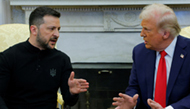a nation of angry
voters, fixed
opposition and
scattered media.
Not when you’ve
made yourself hard
to define.
RICHARDW. STEVENSON ESSAY
WASHINGTON
ON THIS MUCH, President Obama’s friends and foes could agree: He eludes simple labels.
Yes, he’s a liberal, except when he’s not. He’s antiwar, except for the one he’s escalating. He’s for bailouts, but wants to rein in the banks. He’s concentrating ever-more power in the West Wing, except when he’s being overly deferential to Congress. He’s cool, except when he’s fighting-hot.
In a world that presents so many fast-moving and intractable problems, nuance, flexibility, pragmatism - even a full range of human emotions - are no doubt good things. But as Mr. Obama wrapped up his State of the Union address on January 27 with an appeal to transcend partisan gamesmanship, he was plaintively testing a broader proposition: Is it possible to embrace complexity in a political and media culture that demands simple themes and promotes conflict?
The president, whose hallmark has been ideological eclecticism, would clearly like to think the answer is yes. But a year into his presidency, Mr. Obama has lost control of his political narrative, his ability to define the story of his presidency on his own terms. And the main reason is that his story is no longer so simple or easy to tell.
That is no small thing. Presidents have long cultivated thematic definitions of themselves to shape the way their choices are perceived. A strong, clear narrative helps a president connect with voters and explain the journey he is leading. The lack of one invites opponents to craft a less flattering portrayal. As he tries to absorb the lessons of his first 12 months in office and push ahead with his agenda in an election year that holds great peril for his party, Mr. Obama faces a narrative vacuum.
The novelty factor has worn off, along with the power of his positioning as the not-Bush. He is confronting an opposition that has remained remarkably unified in trying to block him at every turn.
Substantively, he has failed, so far, to pass his signature initiative, a health care bill. Voters could be forgiven for not being more impressed with his biggest legislative accomplishment, passage of the $787 billion economic stimulus bill, given that the unemployment rate remains in double digits.
Right now, he’s at risk of his default narrative being: He saved the banks.
“You’ve got to have a clear, easy to understand story,” said Mark McKinnon, an image-maker for George W. Bush’s two presidential campaigns but a professed admirer of Mr. Obama. “Obama’s story is getting very complicated and confusing for voters. Obama is trying to do it all and appease too many constituencies. Voters like him and think he’s smart. But they’re not exactly clear whose side he’s fighting on.”
Mr. Obama rode into office on one of the most elegant stories in recent campaign history: that he was the embodiment of hope and change. It caught the national mood, yet remained vague enough to mean pretty much whatever a voter wanted it to mean. The challenge became more difficult when it became clear late in 2008 that Mr. Obama’s initial agenda would not be one of his choosing. With the financial system melting down, Mr. Obama actively supported crisis steps being taken by the Bush administration and carried them forward.
Suddenly, as the presidential historian Richard Norton Smith put it, “the candidate of change became the president of continuity.”
John Podesta, who runs the Center for American Progress, a liberal research group that advises Mr. Obama, said: “Obama campaigned on a critique of what was wrong with the American economy and an idea of how to restore a sense of progress and opportunity. He needs to reestablish that narrative. The public has shifted in a very dangerous way to thinking he cared more about dealing with Wall Street than he cared about dealing with their problems.”
The White House largely dismisses the warnings.
“The president has had a consistent political narrative since the day he stepped on the national stage in 2004,” said Dan Pfeiffer, the White House communications director. “The interpretation of it is cyclical.”
Yet Mr. Obama acknowledged in his State of the Union address that voters had grown doubtful about his promise of hope and change. Polls suggest he is losing support among independents, and his liberal base is agitated over his Afghanistan policy, his budget and his willingness to compromise on health care.
His recent approach has been to offer something to everyone. There was a promise to move ahead on a measure to allow gay men and women to serve openly in the military, reassurance that the war in Iraq is coming to an end, reassurance that he would fight on in Afghanistan, and proposals for tax cuts for small business, tax credits for families with children, a tax on banks and a freeze on a portion of domestic spending. To Republicans, there was a promise that he would listen to their ideas.
The big question is whether voters perceive him as post-ideological and pragmatic or inconsistent and pandering.
Even defining himself more sharply might not help Mr. Obama because the fragmentation of media and the quickened news cycle means any president has much less power to shape his own narrative.
“If you look at the way the media has been transformed and the way the White House is covered,” Mr. Smith said, “the bully pulpit itself is in danger of being drowned out by talk radio, cable and now Twitter.
스마터리빙
more [ 건강]
[ 건강]이제 혈관 건강도 챙기자!
[현대해운]우리 눈에 보이지 않기 때문에 혈관 건강을 챙기는 것은 결코 쉽지 않은데요. 여러분은 혈관 건강을 유지하기 위해 어떤 노력을 하시나요?
 [ 건강]
[ 건강]내 몸이 건강해지는 과일궁합
 [ 라이프]
[ 라이프]벌레야 물럿거라! 천연 해충제 만들기
 [ 건강]
[ 건강]혈압 낮추는데 좋은 식품
[현대해운]혈관 건강은 주로 노화가 진행되면서 지켜야 할 문제라고 인식되어 왔습니다. 최근 생활 패턴과 식생활의 변화로 혈관의 노화 진행이 빨라지고
사람·사람들
more많이 본 기사
- 황하나, 남편 사망→캄보디아서 남친과 출산..귀국 후 구속 ‘파란만장’
- 젤렌스키 미국행… “레드라인 있지만 타협점 찾을 수 있어”
- 태국-캄보디아, ‘101명 사망’ 교전 20일만에 휴전
- NASA 신임 국장 “美, 트럼프 임기내 달에 다시 갈것”
- 보수 야당 “의원직 사퇴하고 법심판 받아야”…김병기에 총공세
- 국힘 “신천지로 통일교 특검 물타기 안돼”…與 “성역없이 규명”
- 마지막 토요일도 도심 집회… “내란 … 1
- 뉴욕시 폭설에 항공기 수천편 취소·지연 사태
- 오윤아 “子, 학교 떨어져 잘못 키웠나..방치 했나 싶어 눈물”
- 쿠팡 ‘정부 반박’ 영문성명 미묘한 표현차… ‘잘못된 비난’ 부각
- IS 확실했나…트럼프 ‘성탄절 나이지리아 폭격’ 갸우뚱
- 올해 美 기업 파산신청 증가… “관세·고물가·고금리 원인”
- 황하나, 마약 도피 중 캄보디아서 출… 1
- ‘손흥민 감격의 첫 우승’ 올해 축구계 기적 톱8 선정 ‘선수로는 유일’
- “2025년 높이뛰기는 우상혁과 커의 무대” 세계육상연맹 조명... 우상혁도 “커와 계속 경쟁해야 해”
- 특검, ‘로저비비에’ 김기현 부부 기소…尹 뇌물 수사는 경찰로
- 트럼프 “소말릴란드 아는 사람 있나?”…이스라엘 승인에 ‘NO’
- “아동 수출국 오명 벗는다” 70년 만에 해외입양 중단
- “솔직히 자신은 없죠” 3루수 GG 송성문, 유격수도 아닌 외야라니... 생존 본능 발동할까
- “올해 최고 주목받은 테크 거물은 머스크 아닌 래리 엘리슨”
- 소싯적 ‘치기어린’ 주소 “굿바이”…지메일 주소변경기능 도입
- [이지 사이언스] “온난화 막으려면 세계인구 44% 식단 바꿔야…문제는 소고기”
- “SD서 최고 활약 김하성, 2024시즌만큼만 쳐줘도 ATL 3승 더한다” ESPN 극찬
- ‘NCT 탈퇴’ 태일, 성폭행 혐의로 결국 감옥行..징역 3년 6개월 확정
- “출생시민권은 사기”⋯ 이민 2세대 공격 초점 맞춘 트럼프
- 뉴욕한인회, 이번에 이사장 자리 놓고 내홍 조짐
- ‘김건희에 로저비비에 선물’ 김기현 부인 특검 재출석…곧 기소
- 미국, 美방산기업 제재한 中에 “대만 무기판매 보복 강력반대”
- LA 등 서부에 사흘째 폭우…동부엔 폭설 예보
- ‘역대 최연소’ 백악관 대변인 레빗,… 1
- 러, 젤렌스키 미국행 앞 대규모 공습…우크라도 러에 드론 공격
- 작년 운용자산 5조5천억달러…갑부들의 ‘패밀리오피스’ 월가 새 강자로
- “올해 최고 주목받은 테크 거물은 머스크 아닌 래리 엘리슨”
- 찰스 3세, 내년 방미 추진…트럼프에 英왕실 ‘매력 공세’될까
- 조지아 역주행 사고, 한인남편 이어 임신 아내도 사망
- ‘마약 혐의’ 남양유업 3세 황하나 구속… “증거인멸 우려”
- ‘패션왕’ 뷔의 45가지 특별한 순간...日하퍼스바자 생일 특집 컬렉션
- 韓정부, 노란봉투법 해석 지침 공개… 하청 임금·근로조건 좌우하면 ‘진짜 사장’
- ‘서해 공무원 피격 은폐’ 혐의 서훈… 2
- 국제은값 폭등에 개인투자자들 銀투자 대거 유입
- 트럼프, 종전안 들고오는 젤렌스키에 “내승인前엔 아무것도 없다”
- 린다 한 “내년 1월17일 별도 한인회연합회 만들겠다”
- ‘학자금 상환’ 안하면 임금압류
- 러, 트럼프-젤렌스키 종전회담 직전 … 1
- 곽도원, 음주운전 3년 만 복귀각..스토리제이컴퍼니 측 “미팅 했지만 계약 단계 아냐”
- VA·MD 7명 생굴 먹고 식중독…22개주 60여명 감염
- 한미장학재단에 3만달러 영구장학금 기탁
- 물류거점창고에 불체자 8만명 수용 추진
- 한파에 고드름이 주렁주렁… 서울 이번 겨울 첫 한파주의보
- 16세로 성장한 버클리 문학, 성대한 송년 파티
1/5지식톡

-
 미 육군 사관학교 West Poin…
0
미 육군 사관학교 West Poin…
0https://youtu.be/SxD8cEhNV6Q연락처:wpkapca@gmail.comJohn Choi: 714-716-6414West Point 합격증을 받으셨나요?미 육군사관학교 West Point 학부모 모…
-
 ☝️해외에서도 가능한 한국어 선생님…
0
☝️해외에서도 가능한 한국어 선생님…
0이 영상 하나면 충분합니다!♥️상담신청문의♥️☝️ 문의 폭주로 '선착순 상담'만 진행합니다.☎️ : 02-6213-9094✨카카오톡ID : @GOODEDU77 (@골뱅이 꼭 붙여주셔야합니다…
-
 테슬라 자동차 시트커버 장착
0
테슬라 자동차 시트커버 장착
0테슬라 시트커버, 사놓고 아직 못 씌우셨죠?장착이 생각보다 쉽지 않습니다.20년 경력 전문가에게 맡기세요 — 깔끔하고 딱 맞게 장착해드립니다!장착비용:앞좌석: $40뒷좌석: $60앞·뒷좌석 …
-
 식당용 부탄가스
0
식당용 부탄가스
0식당용 부탄가스 홀세일 합니다 로스앤젤레스 다운타운 픽업 가능 안녕 하세요?강아지 & 고양이 모든 애완동물 / 반려동물 식품 & 모든 애완동물/반려동물 관련 제품들 전문적으로 홀세일/취급하는 회사 입니다 100% …
-
 ACSL 국제 컴퓨터 과학 대회, …
0
ACSL 국제 컴퓨터 과학 대회, …
0웹사이트 : www.eduspot.co.kr 카카오톡 상담하기 : https://pf.kakao.com/_BEQWxb블로그 : https://blog.naver.com/eduspotmain안녕하세요, 에듀스팟입니다…
케이타운 1번가
오피니언

새해 더 중요해지는 노동법 준수

연말연시, 안전하고 차분하게
 캐슬린 파커 워싱턴포스트 칼럼니스트
캐슬린 파커 워싱턴포스트 칼럼니스트 [캐슬린 파커 칼럼] 지미 라이의 마지막 희망
 유경재 나성북부교회 담임목사
유경재 나성북부교회 담임목사 [한국춘추] 미국의 힘
 전병두 서북미수필가협회 회원
전병두 서북미수필가협회 회원 [금요단상] 비자 발급
 박일근 / 한국일보 수석논설위원
박일근 / 한국일보 수석논설위원 [지평선] 스님의 주례사
 신상철 / 고려대 고고미술사학과 교수
신상철 / 고려대 고고미술사학과 교수 [미술 다시보기] 신의 모습을 닮고자 한 예술가
 스티브 강 전 한인민주당협회 회장
스티브 강 전 한인민주당협회 회장 [스티브 강 ‘인사이드 미국’] 2026 중간선거: 트럼프 지지율 하락이 말해주는 것
 김홍일 케이유니콘인베스트먼트 대표
김홍일 케이유니콘인베스트먼트 대표 [기고] 안정의 기준은 어떻게 제도가 되었나
1/3지사별 뉴스

물류거점창고에 불체자 8만명 수용 추진
도널드 트럼프 행정부가 이민자 구금·추방을 효율화하기 위해 전국 물류거점 창고에 8만명 규모의 수용시설 확보를 추진한다고 24일 워싱턴 포스트…
‘학자금 상환’ 안하면 임금압류

“온 세상에 희망·평화의 빛 스며들길”
가자지구와 우크라이나에서의 전쟁, 고립과 불평등으로 세상이 어지러운 가운데 워싱턴 지역 각급 한인교회와 성당들이 성탄절을 맞아 일제히 예배와 …
“연말은 스트레스·새해 결심은 없다”

“올해 최고 주목받은 테크 거물은 머스크 아닌 래리 엘리슨”
올해 미국에서 가장 주목받은 기술업계 거물은 일론 머스크 테슬라 최고경영자(CEO)가 아닌 래리 엘리슨 오라클 창업자·회장이라고 블룸버그 통신…
[새해부터 이렇게 달라진다] 최저임금 또 오르고… 유급 병가는 더 확대

오늘 하루 이 창 열지 않음 닫기 






















































.png)


댓글 안에 당신의 성숙함도 담아 주세요.
'오늘의 한마디'는 기사에 대하여 자신의 생각을 말하고 남의 생각을 들으며 서로 다양한 의견을 나누는 공간입니다. 그러나 간혹 불건전한 내용을 올리시는 분들이 계셔서 건전한 인터넷문화 정착을 위해 아래와 같은 운영원칙을 적용합니다.
자체 모니터링을 통해 아래에 해당하는 내용이 포함된 댓글이 발견되면 예고없이 삭제 조치를 하겠습니다.
불건전한 댓글을 올리거나, 이름에 비속어 및 상대방의 불쾌감을 주는 단어를 사용, 유명인 또는 특정 일반인을 사칭하는 경우 이용에 대한 차단 제재를 받을 수 있습니다. 차단될 경우, 일주일간 댓글을 달수 없게 됩니다.
명예훼손, 개인정보 유출, 욕설 등 법률에 위반되는 댓글은 관계 법령에 의거 민형사상 처벌을 받을 수 있으니 이용에 주의를 부탁드립니다.
Close
x